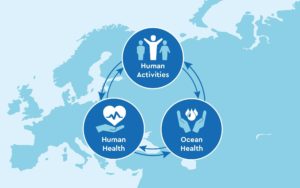A Strategic Research Agenda for Oceans and Human Health in Europe
A newly launched Strategic Research Agenda (SRA) on oceans and human health showcases how deeply interconnected the health of people and the marine environment are.

Oceans and Human Health (OHH) is a meta-discipline exploring the complex and inextricable links between the health of the ocean and that of humans. Christine Domegan, Patricia McHugh and Easkey Britton from the Applied Systems Thinking research group at the Whitaker Institute are part of the multi-partner, interdisciplinary team working on the Horizon 2020 EU-funded Seas Oceans and Public Health in Europe (SOPHIE) project who published the SRA this week.
The SOPHIE SRA sets out existing evidence that the health of seas, oceans and humans are inextricably linked and outlines the research needed to answer fundamental questions in the field of OHH. It describes how evidence should be provided to policy makers and suggests how ocean and health literacy can be improved in Europe and beyond. It outlines vital research priorities and collaborations needed to inform policies and practices to protect the health of seas, oceans and people.
Work carried out by the team at Whitaker included multi-actor stakeholder deliberations or ‘OHH Conversations’, online and in-person, engaging thousands of expert and citizen stakeholders across Europe, to identify key priorities and actions for OHH.
Expert stakeholders contributed 673 individual priorities for OHH. In an online, pan-European survey, citizens from 14 countries were also invited to have their say by identifying their top priorities for OHH, generating over 14,000 priorities. A random sample of 700 responses, 50 from each country, was selected for further analysis. Stakeholder deliberation workshops were facilitated by the Whitaker team in 2019, with 31 expert and 14 citizen stakeholders participating from 13 countries across Europe. Through the use of consensus-based Collective Intelligence method, multi-actor stakeholders generated structural priority maps and 18 calls to action to realise these priorities.
Meta-analysis revealed nine priority themes that are most influential for OHH in Europe, illustrated in the SOPHIE multistage influence map, read from left to right in order of greatest influence (Fig. 1) This map highlights the causal processes that drive OHH dynamics in Europe.
The influence map highlights a need to link knowledge with practice in a way that can support and promote sustainable actions and greater citizen engagement. This presents opportunities for transdisciplinary research and partnership building between research scientists in OHH and marine science, social sciences and public health. Coupled with stakeholder priorities and actions, the map provides robust support for research and actions outlined in the SRA.
For more information and to help share the SRA so we can carry the Oceans and Human Health Agenda forward until 2030 please visit: www.sophie2020.eu

Figure 1. SOPHIE multistage influence map of stakeholder priorities for OHH in Europe.

